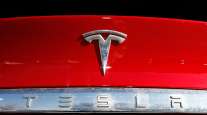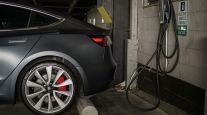Tesla Deliveries Rise to Record After Slashing EV Prices

[Stay on top of transportation news: Get TTNews in your inbox.]
Tesla Inc. increased vehicle deliveries by a slim margin despite slashing prices across its lineup, casting doubt on the staying power of the increase in demand that Elon Musk described early this year.
The electric vehicle maker handed over 422,875 cars to customers in the first three months of the year, up about 4% from its showing in the fourth quarter. While deliveries increased more substantially from a year ago, Tesla has been scaling up production at two new plants since then: one near Berlin and the other in Austin, Texas.
After Tesla cut prices of its top-selling Model Y by as much as 20% and discounted its most expensive vehicles by tens of thousands of dollars, Musk said in late January that orders were running at almost twice the rate of production. The figures reported April 2 show there was a slowdown as the quarter came to a close, as the company ended up making almost 18,000 more cars than it sold.
“Continued excess production over deliveries will keep the debate going on price elasticity versus general demand weakness,” Philippe Houchois, a Jefferies analyst with a buy rating on Tesla stock, said in a note.
In Q1, we produced over 440k vehicles & delivered over 422k vehicles → https://t.co/BNCUpVjHEj — Tesla (@Tesla) April 2, 2023
Tesla shares fell as much as 3.8% as of 8:15 a.m. April 3 in New York, before the start of regular trading. The stock has soared 68% this year after a record rout in 2022.
While Tesla continues to outpace other automakers in global EV sales, it’s facing a stiffer test than ever before from China’s BYD Co., with analysts at BloombergNEF expecting the Berkshire Hathaway Inc.-backed manufacturer to challenge for the No. 1 spot this year.
What’s perhaps more important than bragging rights is Tesla’s ability to keep growing at rates investors are used to. Last year, the company fell short of its target for 50% average annual increase in vehicle deliveries, expanding by 40%. Its first-quarter growth rate slipped to 36%.
“Tesla deliveries were in line with the consensus numbers, but it was a disappointment relative to some of the whisper numbers,” said Gene Munster, managing partner of investment firm Deepwater Asset Management. “They will have to pick up the pace for deliveries for the rest of the year.”
Deliveries were roughly in line with the average estimate of analysts surveyed by Bloomberg of 421,164 vehicles.
Tesla delivered only 10,695 Model S sedans and Model X sport utility vehicles, its most expensive models. That’s the lowest total for those vehicles since the third quarter of 2021, despite price cuts in both January and early March.
Musk has repeatedly criticized the Federal Reserve’s interest rate increases and in December predicted “quite a serious recession” this year. The CEO said then that Tesla may be willing to accept “lower to negative” profits during an economic downturn in order to keep growing at a steady rate.
Want more news? Listen to today's daily briefing above or go here for more info
“With everything going on in the macro environment, these are very good numbers,” said Ben Kallo, a Robert W. Baird analyst with a buy rating on Tesla’s stock. “People will switch very quickly from this number to talking about what the margins will be for the first quarter. There’s been a lot of focus on price cuts hurting margins.”
Tesla doesn’t break out quarterly vehicle sales by region, but the U.S. and China are its largest markets. The company makes the Model S, X, 3 and Y in Fremont, Calif., and the Model 3 and Y in Shanghai. It also produces the Model Y at its plants in Austin and outside Berlin.
Musk tweeted that he walked the production line for Tesla’s long-delayed Cybertruck on April 2 at the Austin plant. Morgan Stanley analyst Adam Jonas tamped expectations for that model in a report last month, calling it a “sideshow” and estimating volume of around 50,000 trucks a year.




